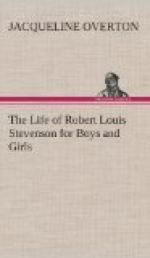“Ever your affectionate friend.
“R.L.S.”
As soon as Stevenson was well enough he returned to Monterey and fell to working upon several short stories and the notes of his voyage, which he brought together and published later under the titles “The Amateur Emigrant” and “Across the Plains.”
Monterey in those days was a small Mexican town; “a place of two or three streets economically paved with sea-sand, and two or three lanes, which were the water courses in the rainy season.... The houses were, for the most part, built of unbaked adobe brick....
“There was no activity but in and around the saloons, where the people sat almost all day playing cards. The smallest excursion was made on horseback. You would scarcely ever see the main street without a horse or two tied to posts, and making a fine figure with their Mexican housings. In a place so exclusively Mexican as Monterey, you saw not only Mexican saddles, but true Vaquero riding—men always at a hand gallop, up hill and down dale, and round the sharpest corners, urging their horses with cries and gesticulations and cruel rotary spurs, checking them dead, with a touch, or wheeling them right about face in a square yard. Spanish was the language of the street.”
He lodged with a doctor and his wife, and took his meals at the little restaurant kept by Jules Simoneau, “a most pleasant old boy,” with whom he played chess and discussed the universe daily.
About the middle of December he pushed on to San Francisco, and prepared to settle down and work for an indefinite time. Though he had known but few people in Monterey, nevertheless it was a social little place in comparison to a great city like San Francisco, where Stevenson found himself indeed a stranger and friendless and learned for the first time in his life what it really meant to be lonely.
Funds were running low; so he secured the cheapest possible lodging and took his meals at various small restaurants, living at the rate of seventy cents a day.
On December 26 he wrote: “For four days I have spoken to no one but my landlady or landlord or the restaurant waiters. This is not a gay way to pass Christmas, is it?” But some days later, nothing daunted, he added: “I lead a pretty happy life, though you might not think it. I have great fun trying to be economical, which I find as good a game of play as any other. I have no want of occupation and though I rarely see any one to speak to, have little time to worry.”
To make matters worse, letters containing money went astray and word came that some articles submitted to his publishers in England, on which he had depended for funds, were not satisfactory, and this forced him to reduce his living expenses to forty-five cents a day. The letters from home were most unsatisfactory and lacked the kind of news he longed for. “Not one soul ever gives me any news,” he complained to Sidney Colvin, “about people or things, everybody




